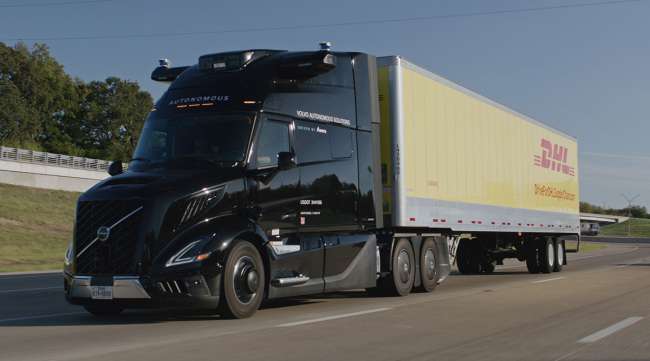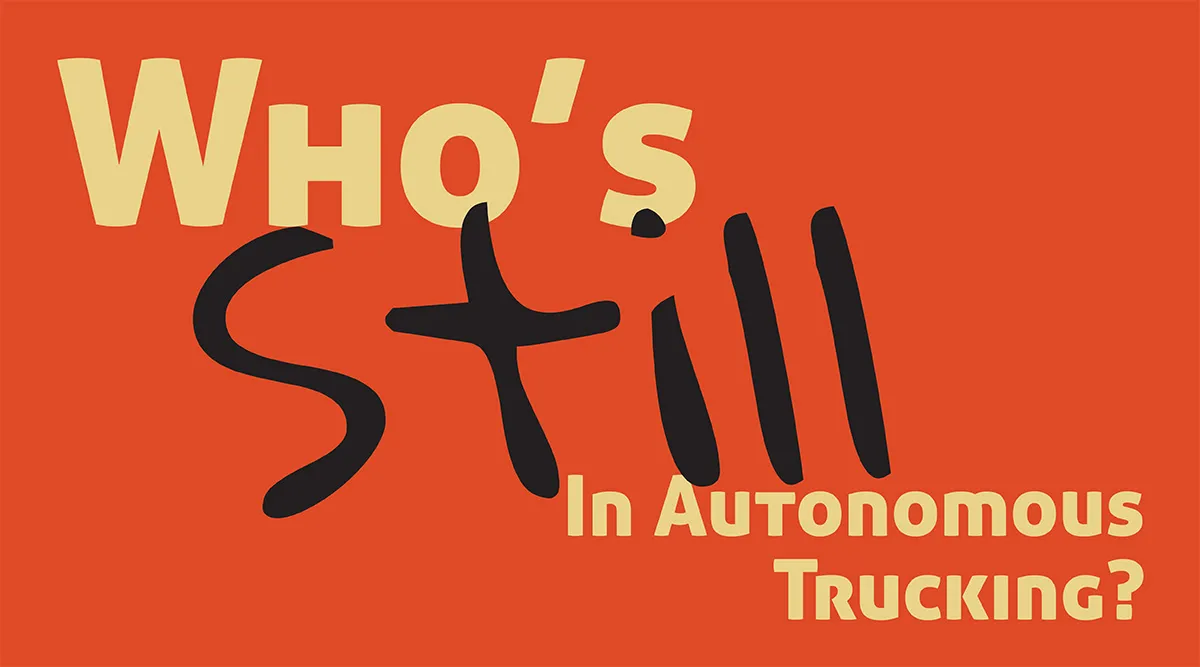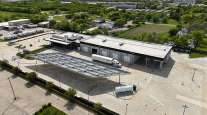Staff Reporter
Volvo Autonomous Solutions, DHL Hit the Road Together

[Stay on top of transportation news: Get TTNews in your inbox.]
Volvo Autonomous Solutions’ factory-built VNL Autonomous Class 8 tractors hit the road for the first time as part of a commercial operation Dec. 4, hauling freight for DHL Supply Chain.
Freight will initially run on two lanes in Texas, Dallas to Houston and Fort Worth to El Paso, the Volvo AB unit said.
“Early adopters play a pivotal role in accelerating the deployment and acceptance of autonomous technology, enabling us to validate both safety and operational performance,” VAS Head of On-Road Solutions Sasko Cuklev said.
“Our collaboration with DHL Supply Chain exemplifies the potential of autonomy as a complementary mode of transport that increases freight capacity and optimizes supply chain efficiencies,” he added.
DHL Supply Chain ranks No. 14 on the Transport Topics Top 100 list of the largest logistics companies in North America. Its parent company, DHL Group, ranks No. 5 on the TT Top 50 list of the largest global freight companies.
DHL sees autonomous trucks as a means to reliable longhaul capacity, DHL Supply Chain North America President of Transportation Jim Monkmeyer said.

Monkmeyer
“Volvo’s legacy of safety and relentless pursuit of innovation make them an ideal partner in our journey to elevate trucking efficiency and deliver greater value to our customers,” Monkmeyer said.
DHL expects benefits from the ramp-up in autonomous trucking in performance and sustainability as well as safety, Jason Gillespie, DHL Supply Chain’s senior director of continuous improvement and innovation, told Transport Topics in a Dec. 12 interview.
Also, he noted that the more autonomous trucks there are on the road, the less severe the ongoing driver shortage will be. The driver shortage ranked No. 9 on the American Transportation Research Institute’s 2024 list of Top Industry Concerns. ATRI surveyed trucking executives to compile the list.
Commencing commercial operations marks a critical phase in validating the full ecosystem required for autonomous transport at scale, VAS said.

VAS President Nils Jaeger by Volvo Group
“For a large-scale deployment of autonomy, in addition to the autonomous truck, there also needs to be a cohesive and seamless support network of surrounding infrastructure, which creates a comprehensive autonomous ecosystem that enables daily operations,” VAS President Nils Jaeger said.
Jaeger said during Volvo Group’s Capital Markets Day in Dublin on Nov. 14 that VAS was creating a new transportation ecosystem, adding that the VNL Autonomous was the starting point for the deployment of a platform across all Volvo Group truck brands.
“We are creating a new transport ecosystem because we believe this ecosystem is required to facilitate toward the adoption of autonomy,” he told analysts.
“We are ready from an ecosystem point of view. … When we are ready, we want to scale, and not [just] double-digit numbers” but rather hundreds and thousands of trucks, Cuklev told reporters during a November presentation in Greensboro, N.C., adding: “We will be one of the winners.”

VAS Head of On-Road Solutions Sasko Cuklev by Keiron Greenhalgh/Transport Topics
In the same interview with TT alongside Gillespie, Cuklev said VAS is looking into a ramp-up of lanes, but discussions will need to be held with technology partner Aurora Innovation and also with customers. “We will be very much guided by our customers,” he added.
“The good news is there’s plenty of freight in Texas to keep us busy,” Gillespie said.
Self-driving technology on the tractors is sourced from Aurora, whose Aurora Driver sensors include high-resolution cameras, imaging radar and proprietary long-range lidar enabling autonomous operations at highway speeds.
Initially, a safety driver will be present to monitor performance and aid integration into existing logistics networks.
The list of redundant safety systems in addition to the safety driver to be initially present includes braking, steering, communications, computation, power management and energy storage.

►Who's Still In Autonomous Trucking?
►Clevenger: Autonomous Trucking: A Rapidly Shifting Landscape
►Company snapshots: Aurora | Kodiak | Torc | Waabi | Stack AV | Gatik | Plus | Einride | Forterra | Outrider
►From November 2022: Who's Who in Self-Driving Truck Development
VAS and Aurora began working together in 2018 on self-driving truck development and then announced a formal development partnership in March 2021, before debuting a prototype later that year.
The Volvo VNL Autonomous truck was unveiled during a May 20 news conference at the Advanced Clean Transportation Expo 2024 in Las Vegas.
The first batch of 25 autonomous trucks was built at VTNA’s New River Valley production plant in Dublin, Va.
Aurora’s technology was factory-installed. “We are not part of the traditional autonomous vehicle race,” Cuklev said during the Greensboro presentation, adding that it is not “just give me your truck, and I will update it.”
VAS previously announced partnerships with Uber Freight and Ascend Transportation.
Lori Heino-Royer of Waabi discusses the latest developments, breakthroughs and key industry partnerships in autonomous trucking. Tune in above or by going to RoadSigns.ttnews.com.
The freight broker and subsidiary of Uber Inc. announced a long-term strategic partnership in December 2022 to deploy VAS’ autonomous transport network within Uber Freight’s marketplace.
Truckload carrier Ascend — which focuses on middle-mile transportation — said in February 2023 that it had reserved capacity on VAS’ first hub-to-hub autonomous transportation lane.
VAS is the first of Aurora’s OEM partners to begin commercial autonomous operations. Aurora is also collaborating on autonomous trucks with Paccar Inc., parent company of Kenworth and Peterbilt.
Daimler Truck’s self-driving truck unit, Torc Robotics, aims to commercialize fully autonomous trucks by 2027 and recently began validating fully autonomous trucks in a closed-course environment.
International Motors, meanwhile, teamed up with Santa Clara, Calif.-based Plus to develop autonomous trucks in March. International Motors was known as Navistar at the time the deal was announced.
Want more news? Listen to today's daily briefing below or go here for more info:





